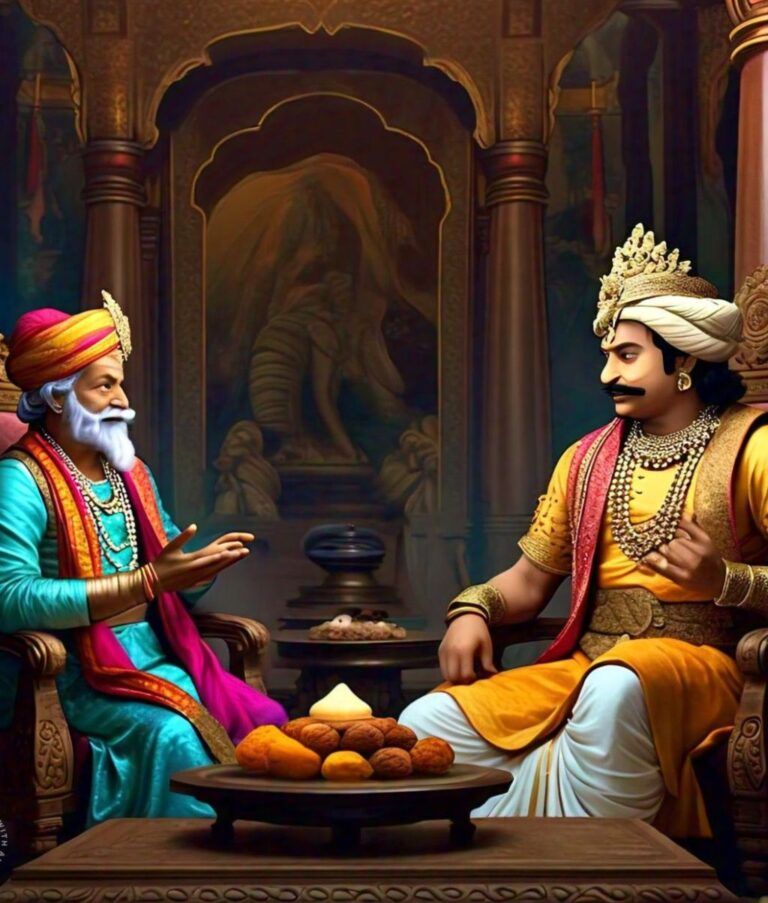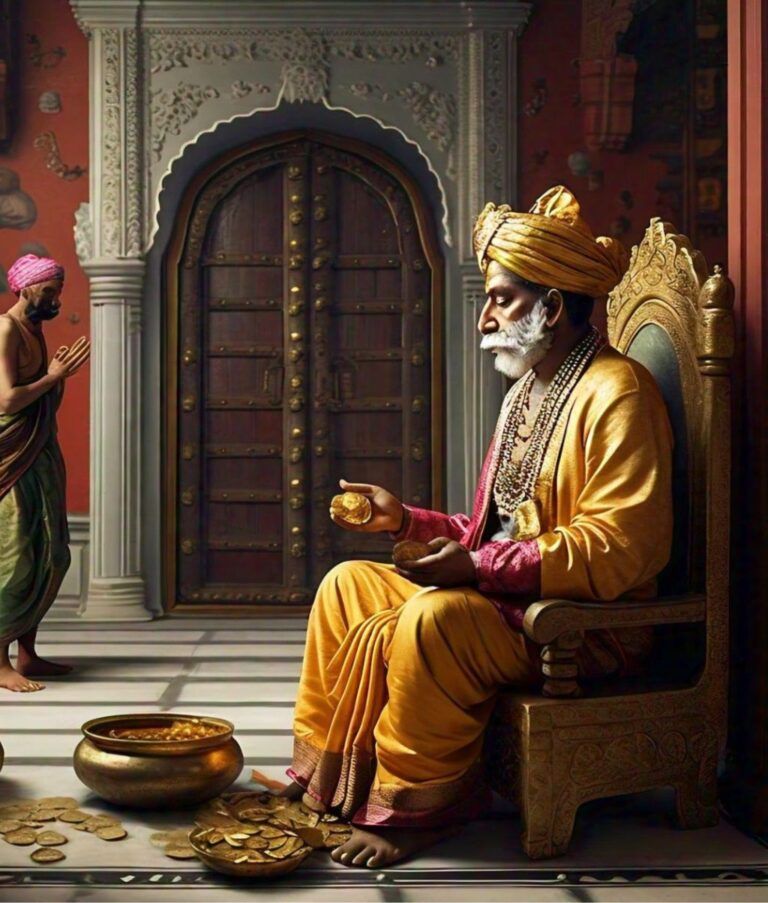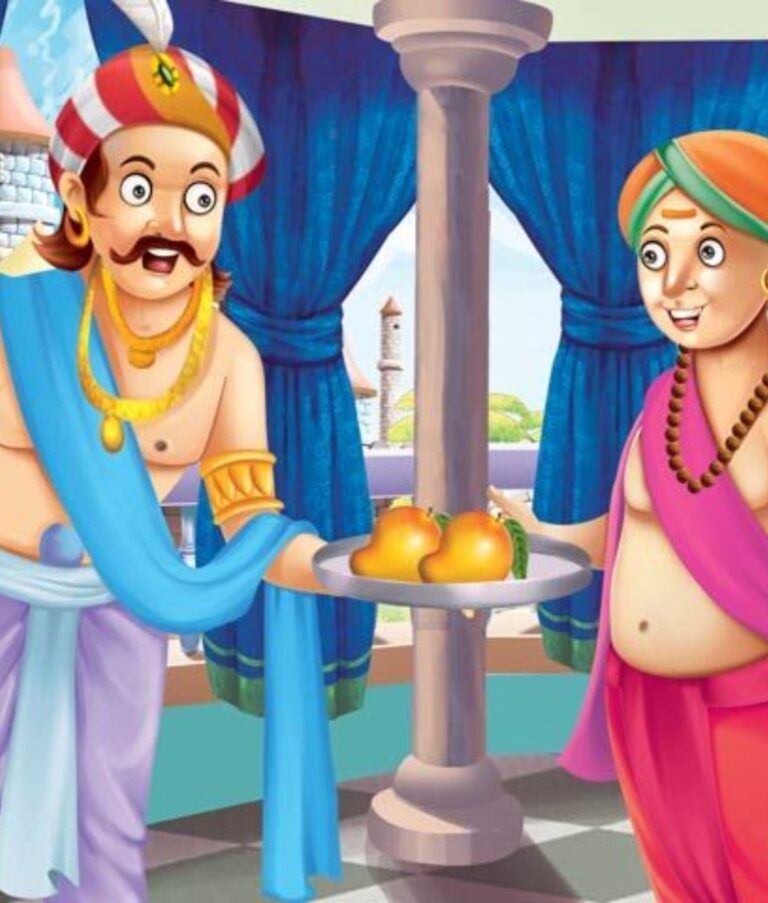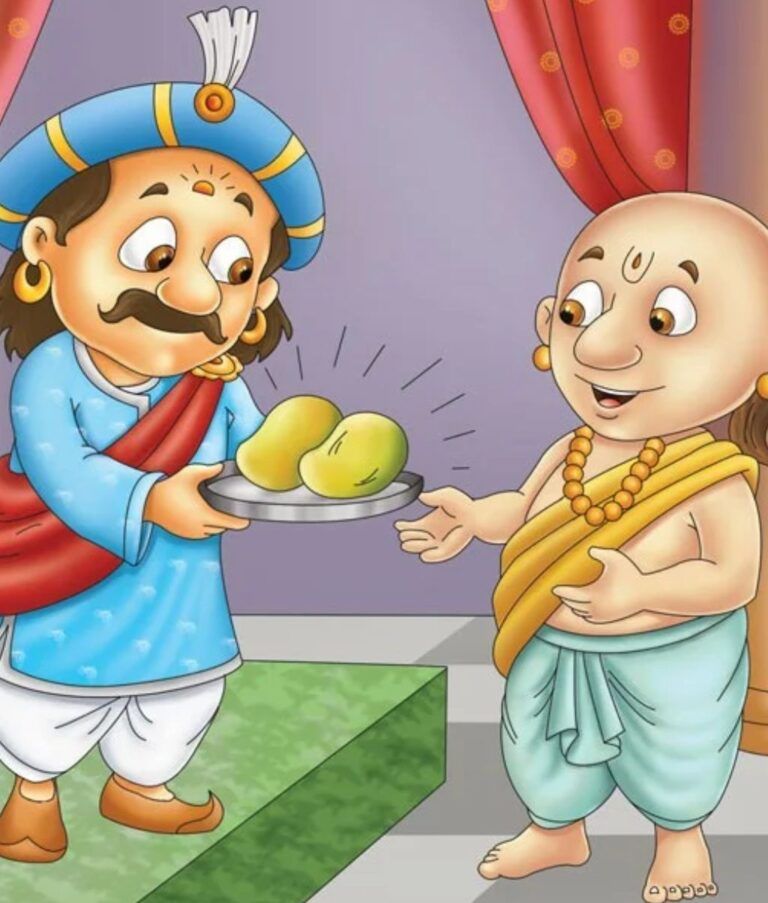Tenali Rama Stories in English with Moral
Tenali Rama Stories , a legendary person from Indian folk tradition, is renowned for his intelligent and wisdom. Set in the royal court of Vijayanagara, his stories show his cleverness in overcoming challenges through humor and smartness. Known for his satirical commentary on common rules, Tenali Rama’s tales entertain while timeless lessons in life and human nature. His quick thinking and ability to outsmart opponent make him a beloved figure, symbolizing intelligence and talent. Exploring the adventures of Tenali Rama offers not just entertainment but also insights into historical values and the enduring power of Intelligence and talent.
Chapter 1. The Brinjal Curry

In a bustling market of Vijayanagara, a heated argument erupted between two vendors over the price and quality of brinjals. The matter escalated to King Krishna Deva Raya’s court, where both claimed ownership of a particularly large and exquisite brinjal. Unable to resolve the dispute, the wise king summoned Tenali Rama.
Tenali, renowned for his sharp intellect and wit, proposed a simple solution. He ordered the brinjal to be cut open. Inside, concealed deep within the vegetable, was a gold coin. Tenali explained that the true owner would have no issue with parting with the brinjal to verify its contents. The dishonest vendor, fearing exposure, confessed, and justice was served.
Moral: Dishonesty will always be exposed; it’s better to be truthful and face the consequences than to deceive and be caught.
Chapter 2. The Cat That Pretended to be a Rat

A notorious gang of thieves plagued Vijayanagara, terrorizing its citizens. They would sneak into houses at night, stealing valuables. One night, they entered a house where Tenali Rama had already set his plan in motion. He placed a cat in a cage and made it squeak like a rat.
Curious, the thieves approached cautiously, believing it to be a rat. One by one, they were caught off guard as Tenali’s cat revealed itself. With the cat’s help, Tenali managed to capture all the thieves and handed them over to the authorities, earning praise for his cleverness and bravery.
Moral: Cleverness and wit can triumph over brute force; using intelligence and strategy can lead to success.
Chapter 3. The Horse Trader

A trader arrived at the royal stable claiming to sell the finest horses from distant lands. Impressed by their strength and beauty, the king was ready to make a hefty purchase. However, Tenali Rama, skeptical of the trader’s claims, devised a plan.

He secretly examined the horses and discovered that they were ordinary horses painted with stripes to appear exotic. To expose the fraud, Tenali proposed a race. As expected, the painted stripes washed off during the race, revealing the truth. The embarrassed trader fled, and the king learned to trust Tenali’s judgment.
Moral: Looks can be deceiving; always verify claims before accepting them at face value.
Chapter 4. The King's Dream

One night, King Krishna Deva Raya had a perplexing dream that left him troubled. In the dream, he saw himself surrounded by shadows whispering cryptic messages. Disturbed, he summoned Tenali Rama to interpret its meaning.

Tenali listened carefully to the king’s recounting of the dream and deciphered it as a warning against trusting false advisors. He advised the king to remain vigilant and to rely on those loyal to him. Pleased with Tenali’s insight, the king rewarded him and heeded his advice, strengthening his rule.
Moral: Trust those who have proven themselves loyal and wise; be cautious of false advisors.
Chapter 5. The Miserly Merchant

Known for his immense wealth and stinginess, a merchant in Vijayanagara refused to help the poor and needy. Curious to teach him a lesson, Tenali Rama devised a plan.
He disguised himself as a beggar and approached the merchant’s doorstep seeking alms. The merchant, in his arrogance, ignored Tenali’s pleas. Undeterred, Tenali returned the next day in a different guise, this time as a wealthy nobleman seeking the merchant’s assistance.
Recognizing Tenali, the merchant realized his mistake and learned the value of generosity. He began to contribute to the welfare of the city, earning him respect and admiration from the people.
Moral: Generosity and kindness are virtues that bring respect and admiration; selfishness and arrogance lead to downfall.
Chapter 6. The Golden Mangoes

In this tale, Tenali Rama outsmarts a greedy man who steals golden mangoes. The story unfolds in the kingdom of Vijayanagara, where a wealthy merchant showcases his prized possession: golden mangoes. These mangoes are so precious that they are stored in a secure room with guards.

However, a cunning thief manages to steal them, creating a stir in the kingdom. When King Krishna Deva Raya hears of this, he summons Tenali Rama for assistance. Tenali, known for his sharp wit, devises a plan. He spreads the rumor that the stolen mangoes were so magical that they would make anyone who stole them turn into a golden statue.
The greedy thief, fearing for his life, rushes to return the mangoes.Tenali Rama reveals that the mangoes were not really magical but had been coated with a special golden powder that would leave a mark on anyone touching it. The thief is caught red-handed with the telltale mark, and justice is served.
Moral: Greed leads to downfall; the consequences of dishonesty will eventually catch up with you.
Chapter 7. The Pundit's Wisdom

In this story, Tenali encounters a pompous pundit who boasts of his vast knowledge. The pundit challenges Tenali to a test of wisdom, confident that he will emerge victorious. The challenge is to answer a series of complex philosophical questions posed by the king.
While the pundit struggles to provide satisfactory answers, Tenali adopts a different approach. He asks the king a simple yet profound question, which stumps the pundit completely. The question highlights the importance of practical wisdom over mere theoretical knowledge.
The king, impressed by Tenali’s insightful question, declares him the winner. The pundit, humbled by the experience, learns a valuable lesson in humility and the limits of scholarly wisdom.
Moral: Practical wisdom is more valuable than theoretical knowledge alone; humility and open-mindedness are essential traits.
Chapter 8. The Royal Parrot

In this tale, the king’s beloved pet parrot goes missing, much to the distress of everyone in the palace. Despite extensive searches, the parrot remains elusive. The king, deeply saddened, offers a handsome reward for anyone who can find and return the parrot.

Tenali Rama takes up the challenge. Instead of searching high and low like everyone else, he decides to use his wit. He spreads word in the kingdom that a magnificent talking parrot, which resembles the king’s missing bird, has been found in a nearby village.
Sure enough, a greedy man who had stolen the parrot hears the news and rushes to claim the reward. However, as soon as he presents the parrot to the king, the parrot starts squawking in the man’s voice, revealing him as the thief. The king is delighted to have his parrot back and rewards Tenali for his clever plan.
Moral: Deception doesn’t last; dishonesty will always be revealed, and honesty prevails in the end.
Conclusion
These stories showcase Tenali Rama’s diverse talents, from solving mysteries and imparting wisdom to resolving disputes and demonstrating his intellectual prowess. Each tale reflects his unique approach to problem-solving and his ability to use wit and humor to navigate complex challenges in the kingdom of Vijayanagara.
FAQ'S
Frequently Asked Questions
Who is Tenali Rama in English?
Tenali Rama, also known as Tenali Ramakrishna, was a legendary figure in Indian folklore, celebrated for his wit, intelligence, and humor. Born as Garlapati Ramakrishna in Tenali, he served in the court of Vijayanagara Emperor Krishnadevaraya in the 16th century. Renowned for his sharp intellect, he often solved complex problems with clever solutions. Many stories depict his interactions with the king and his court, where his quick thinking exposed hypocrisy and deceit. Besides being a skilled poet and scholar, Tenali Rama was a strategist who used his wit to outsmart rivals and navigate tricky situations.
Who is smarter, Birbal or Tenali Rama?
Determining whether Birbal or Tenali Rama is smarter is subjective, as both are legendary figures renowned for their wit and intelligence. Birbal, an advisor in Emperor Akbar’s court, is celebrated for his wisdom and diplomatic problem-solving skills. Tenali Rama, a poet and advisor in King Krishnadevaraya’s court, is known for his cleverness, humor, and resourcefulness. While Birbal’s tales emphasize wisdom and courtly diplomacy, Tenali Rama’s stories highlight humor and ingenuity. Both figures are iconic in their respective traditions, making it difficult to definitively say who is smarter. Their legacies reflect different aspects of intelligence and wit.
Did Birbal meet Tenali Rama in real life?
Birbal and Tenali Rama are both celebrated figures in Indian folklore, known for their wit and wisdom. Birbal served in the court of Mughal Emperor Akbar in the 16th century, while Tenali Rama was a poet and advisor in the court of Vijayanagara Emperor Krishnadevaraya during the same period. Despite their overlapping timelines, there is no historical evidence to suggest that Birbal and Tenali Rama ever met in real life. The stories of their encounters are purely fictional, created to entertain and convey moral lessons. Historical records and their geographic locations make such a meeting highly improbable.
